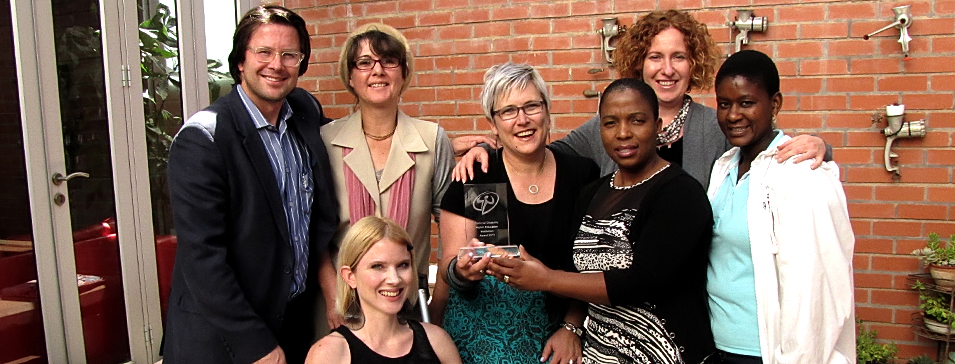Latest News Archive
Please select Category, Year, and then Month to display items
06 April 2018
Photo Rulanzen Martin
 From the left: Dr Thulisile Mphambukeli, leader of the BRICS research team that is exploring the political economy of water and food security, and her research partner, Dr Victor Okorie.
From the left: Dr Thulisile Mphambukeli, leader of the BRICS research team that is exploring the political economy of water and food security, and her research partner, Dr Victor Okorie.
A Brazil, Russia, India, China and South Africa (BRICS) delegation is to hold the 10th Annual BRICS Summit in the last week of May 2018 in Johannesburg. Dr Thulisile Mphambukeli, leader of the University of the Free State (UFS) research team alongside Dr Victor Okorie from the Department of Urban and Regional Planning, in collaboration with Prof Lere Amusan of North-West University, will ensure that water and food security is a prominent feature on the gathering’s agenda.
First, the project titled: “Exploring the political economy of water and food security nexus in BRICS and Africa” will debut at the National Institute for the Humanities and Social Sciences BRICS Think Tank Forum”.
According to Dr Mphambukeli, the key to water security is attitudinal change by means of education and conscientisation. This, she is adamant about, holds the potential to drive behavioural adjustments in the way society interacts with water.
Genetic and social approaches
Dr Okorie asserts that if strides towards reducing the demand for water were to be made, research efforts should be geared towards effecting changes at DNA level. Meaning we need to explore waterwise ways that enable crops and animals to thrive optimally.
The project also looks at social dimensions of water such as flushing a toilet. “Research activities on redesigning toilets, especially the urinal, where more than nine litres of water are used to flush less than one cubic centimetre of urine, are timely in the context of managing water and the food nexus crises,” said Dr Okorie.
Combining the genetic and social approaches would allow us to produce more with a smaller water footprint. This can be made possible by implementing precision agriculture which is about estimating and applying exact quantities of water and nutrients needed for the production of crops or the raising of livestock.
Paradigm shifting policies
Prof Amusan said the team intended to propose functional solutions that take the quality of water into consideration. Equitable production and distribution of water depends on endorsing policies of co-production between citizens, governments and the public sector. BRICS member states mutually consider water and food security as an issue of paramount significance, hence its feature on this prestigious summit’s agenda.
University recognised as leading Higher Education Institution for students with disabilities
2013-12-05
 |
The University of the Free State has been lauded for creating an inclusive environment for persons with disabilities, winning the 2013 National Disability Higher Education Institution Award. The award was presented at the National Disabilities Awards held in Port Elizabeth as part of the celebrations for International Day of People with Disabilities.
The Deputy Minister for Women, Children and People with Disabilities, Hendrietta Ipeleng Bogopane-Zulu, commended the university during the event for standing out among South African institutes of higher education. She told the audience the award gives recognition to institutions that demonstrate, through their strategy and policy, the provision of an inclusive environment for persons with disabilities. This is done through the use of technology and accessibility at their premises.
It's not the first time the university received praise from the deputy minister. In 2012 she visited the Bloemfontein Campus as part of a nation-wide roadshow to assess disability compliance and support services at all universities and FET colleges. Impressed with the work of the Unit for Students with Disabilities (USD), she recommended that staff from various higher education institutions visit the campus to gain insight into what they are doing.
Receiving the award on behalf of the university, Hetsie Veitch, Director of the USD, says the award recognises the commitment of the university’s senior leadership, who support the USD in creating a learning environment that is welcoming and accessible to all students.
Rudi Buys, Dean of Student Affairs, says the university is appreciative of what the USD does and says the award is a great achievement for a unit that only started functioning on its own three years ago. “The role of our support unit for Students with Disabilities has since 2010 grown to hold not only a prominent place in our institutional reflection on and implementation of approaches of universal access, but also to stand as leading department in building and bearing witness to the commitment of the UFS to values of universal access.”